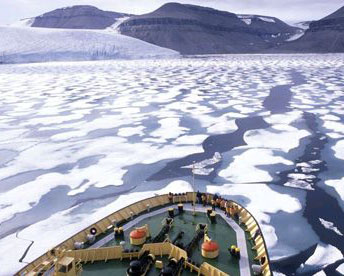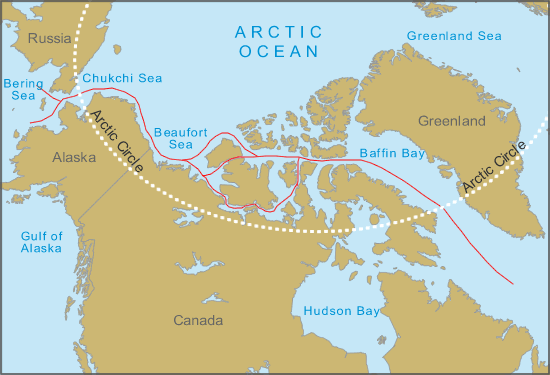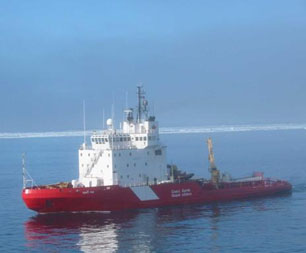Canada’s new regulation of Northwest Passage vs. “The Outlaw Sea: A World of Freedom, Chaos, and Crime”
Jul 12th, 2010 | By Randall White | Category: In Brief“Why are you keeping these things if you’re never going to look at them again?” It’s a good question. So I recently re-read Jonathan Raban’s review of The Outlaw Sea: A World of Freedom, Chaos, and Crime by the estimable William Langewiesche, in the August 12, 2004 issue of the New York Review of Books.
Strictly by accident, this proved helpful background for interpreting such press reports from last week as: “Shipping rules called ‘drastic’ … ” ; “International shippers object to Canadian claims to Northwest Passage” ; “New Northwest Passage rules may violate international law” ; “New Northwest Passage rules violate international law, shippers say … ” ; “New Arctic shipping regulations draw fire … Carriers pan ‘drastic’ system.”
The point is that we now have some “new rules regulating Arctic shipping … introduced by Canada on July 1,” 2010. They include a “mandatory registration system” for vessels traveling through the ancient and heretofore not actually very useful Northwest Passage, which global warming may be giving some kind of new lease on life.
This push for “Arctic sovereignty”probably adds up to one of the few seriously impressive things that Stephen Harper’s minority government in Ottawa has done, since its first day in office on February 6, 2006. And we the Canadian people should not be cowed by criticism from “the Denmark-based Baltic and International Maritime Council” (even if it does include “companies accounting for 65 per cent of the cargo shipped around the world”), or anyone or anything else.
* * * *

Ice breaker makes its way through Northwest Passage. The ice packs are breaking up in season with global warming.
The Council, for instance, is miffed that “Canada ignored its request earlier this year to have the proposed new Arctic regulatory regime vetted first by a committee of the International Maritime Organization, which oversees global shipping traffic.”
Yet as Jonathan Raban’s review of Langewiesche’s The Outlaw Sea explained a half dozen years ago : “Though there now exists an International Law of the Sea … and its enforcing body, the International Maritime Organization, the best efforts to police the sea have so far proved alarmingly ineffective … The flag of convenience – that flimsiest of legal fictions – bears much of the blame for the lawless state of the sea. Few ships engaged in international trade have ever come within sight of the port of registration displayed on their sterns.”
Raban’s review boils over with this kind of thing. The sea, Langewiesche’s book tells us, “is still wild: as global warming takes hold, shipwrecking storms are beginning to blow more fiercely … Mankind has always had much to fear from the ungovernable sea, and never more so than in this period … when who knows what abominations may soon arrive on our shores from the lawless terrain of the world’s oceans.” Raban concludes with: “As Langewiesche makes frighteningly clear, there is very little that governments can do to regulate nefarious activities on the high seas.” But: “Coastal waters are of course another matter.”
What Canada’s new Arctic regulatory regime does is treat the ancient mystical Northwest Passage as Canadian coastal waters. Not everyone in the international community seems happy about this, for various often self-interested reasons. But it probably does make sense – from the standpoint of both Canadian self-interests and the safety and even commercial security of all seafaring global villagers, who may or may not soon enough find the Northwest Passage a more alluring trade route than it used to be.
Besides, even the critics in the Baltic and International Maritime Council have said that there “will be compliance” with the new Canadian regulations. And, they add: “we are very much in favour of everybody contributing to a very safe environment in these Arctic waters.” That is all that matters in the end.
So …Â In the absence of better information, it certainly seems to me that we the Canadian people should just stand behind our federal government here, however much we may or may not dislike it on other grounds. And we should not worry so much about what critics in the wider international community may say. (Some of them, Mr. Raban and Mr. Langewiesche appear to be telling us, are just criminals in any case.)
PS: If you are wired for sound, you might be interested in one or more of these four different You Tube versions of the near-legendary Canadian folk-song classic “Northwest Passage” by the late Stan Rogers (1949—1983): “Stan Rogers – Northwest Passage” ; “Stan Rogers – One Warm Line” ; “The National : Northwest Passage” ; “Northwest Passage”.
What happened to Stan Rogers? He “died alongside 22 other passengers (23 fatalities in all) most likely of smoke inhalation on June 2, 1983, while travelling on Air Canada Flight 797 (a McDonnell Douglas DC-9) after performing at the Kerrville Folk Festival. The airliner was flying from Dallas, Texas to Toronto and Montreal when an in-flight fire forced it to make an emergency landing at the Greater Cincinnati Airport.”





[…] Canada’s new regulation of Northwest Passage vs. “The Outlaw Sea: A World of Freedom, Chaos, and… […]
http://www.moviecityonline.com/northwest-passage-volume-3/
[…] Canada’s new regulation of Northwest Passage vs. “The Outlaw Sea: A World of Freedom, Chaos, and… […]http://www.moviecityonline.com/northwest-passage-volumes-1-2/
The world bodies that complain are trying to muscle in on what is and has been canadian land and waters. The attitude is probably start with waters and see what they can gain. The world knows the archipelago and surrounding waters along with the passage(which is still not and has never been a shipping passage to date) are canadian. canadians know these waters are canadian as well. Passage will be the only issue. Canada is clear about protecting its territory and peoples from harm with sound laws applicable to all. Passage will be controlled.